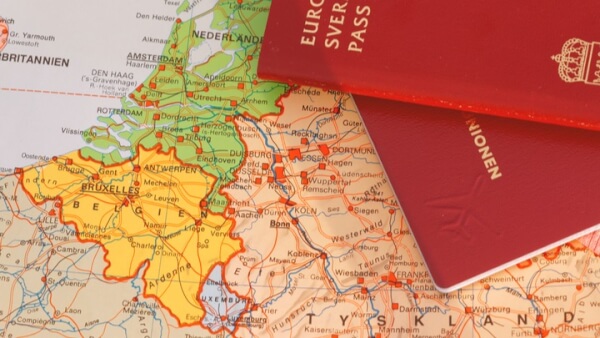Inheritance tax in Belgium: What you need to know
Discover everything you need to know about inheritance tax in Belgium. Our comprehensive guide covers the rates, who pays, how to calculate, and much more.

Brussels is the de facto capital of Europe, and with many European institutions and global businesses based there, it’s become a hub of expat activity. A cosmopolitan and youthful city, renting in Brussels can certainly come with perks. However, as Belgium is a compact country with great public transport links, even those working in Brussels day to day can choose to live outside the city. Places like Genval or Leuven offer a great alternative to families looking for something a little different.
Of course, if city life is your thing, then there are also the fabulous centres of Antwerp, Ghent and Bruges. Those spots will offer you your perfect Belgian home with all the culture and history you like, but on a more wallet-friendly budget. Rental prices in Antwerp, for example, are 25% lower than in the capital. That means a lot more home for your money.
If you’re thinking of moving to Belgium for work or study, then check out this guide to renting in Belgium.
The rental market in many places in Belgium is well stocked. That means you should be able to view properties without worrying that they’ll be taken immediately by other tenants. If you’re looking for a place to rent, you can look for rental properties yourself in newspapers, online or by looking around in your chosen neighbourhood with signs that say à louer/ te huur (for rent). Or, if you want a bit more assistance on your first go, you can get help from a real estate agent - especially if you’re unsure of the market in your area or where you’d like to live.
There are two different types of agents available.
A rental agent will simply make referrals. That means you’ll pay a fee to be put in touch with the landlord’s properties, but then you’ll negotiate the deal yourself.
An estate agent, on the other hand, works directly for the landlord and is paid a fee by them. As a tenant, you won’t have to pay a fee. Although, the estate agent must give you accurate information and work in your interests as well.
Most properties in Belgium are offered unfurnished. It’s worth checking with the property owner or agent what condition the property will be in, as unfurnished might mean that there are no carpets or even basic electrical appliances.
The rental market in Belgium might not be quite the same as in your home country. Avoid any nasty surprises by doing a little research before you make your move.
As a tenant in Belgium you have rights which are legally protected.
In most cases a properly registered tenancy is very well protected. Although to take advantage of these rights, you’ll need to be sure your contract is registered with the local authorities. If you want to give notice and leave, you’ll need to pay the penalty outlined in the contract. However, the upside of this is that if your landlord wants to evict you, he’ll likely need to give you six months advance notice and set out his reasons for doing so very clearly.
If you think your landlord isn’t treating you fairly, you should contact theChambre D’Arbitrage & De Mediation, where specialists can help you negotiate with your landlord and resolve any issue.
Before you choose a new home in Belgium, you should make sure you know exactly what state the property will be in when you move in, and, of course, in what condition it must be returned. If you saw the property with a tenant still living there, know that they might be required to remove all soft furnishings such as carpets and curtains and any electrical appliances they have. Then return the apartment to its unfurnished state before handover. If you’re not expecting it, it could be a costly surprise.
You should also check the wording in the tenancy agreement as some deceitful landlords might ask for the property to be handed back in ‘perfect’ condition rather than simply stating it should be given back as you found it.
Rental agreements in Belgium must be covered by a written contract, which is drawn up and signed by both you and the landlord. Rental agreements have to be formally registered, so you’ll have to provide a copy of the signed contract to the local registry office to show the deal has been properly concluded. Usually the landlord will do this for you.
Examples of the differenttypes of Belgian rental contracts can be found online and tailored to your situation. If necessary, you can ask your landlord or agent for amendments to the contract if you think clauses should be added, changed or removed. For example, you may choose to request the addition of a ‘diplomatic clause’ to give you a shorter notice period if you suddenly need to move out because of a work change. There’s no compulsion for a landlord to accept addendums, but it’s not uncommon in cities with large expat communities that frequently relocate.
Deposits are generally 3 months of rent and will be held by the landlord or agent in a separate account so they’re not incorporated into their business or personal cash flow. It’s also important to note that you should never hand over cash as a deposit - use a bank transfer. If you’re making an international money transfer that includes currency conversion, it’s worth finding the best possible deal with a company like Wise so you don’t get slapped with poor exchange rates.
Before you finalise a rental agreement, you should make sure you’re clear on the terms. In most cases, phone, electricity and water bills will be paid by the tenant although your landlord can give you an idea of the average costs. Waste collection will usually be included in your rental costs, and arranged according to your local council’s schedule.
Details of the bills paid by the tenant will be set out in the tenancy agreement and are likely to include some maintenance costs. If you have a garden, then you will be obliged to look after it and you might need to pay for the upkeep of communal areas if you're in a flat. Tenants are typically responsible for much of the upkeep of a home they rent in Belgium, but the upside of the deal is that landlords will often allow tenants to make reasonable changes to the property to suit their needs.
It’s okay to negotiate on the rental cost. It’s also worth asking what fees are required for maintenance if you’re in an apartment block and what the usual utilities costs are. That way, you should get a better view of the cost of the property.
There’s no legal reason why you can’t get a flat without a job. Though individual landlords might have their own requirements. Landlords will certainly want to check that you’re able to pay the rent for the duration of the lease. As such, if you don’t have a job yet, you might need to offer additional proof in order to rent.
To finalise a rental agreement you’ll have to prove your residency status, identity and that you’ll be earning enough to cover your costs and service any outstanding debt. You can often prove you’re capable of paying the rent by providing paperwork showing you have adequate savings. Another method, depending on the landlord’s requirements, is through a credit check. In addition, your employer may be able to help by providing proof of your earnings or acting as a guarantor on your behalf.
Standard rental contracts are known as:
For expats, it’s common to take on a property on a short term contract which can later be converted into a ‘nine year’ contract if needed. The exact details vary between individual contracts and may be negotiable, but the shorter contracts usually include penalties if the tenant leaves within the first three years. As an example, the penalty may be three months rent if you leave in the first year, two months for leaving in the second year and one month if you leave in the third. Some tenancy agreements will have a clause requiring you to pay the entire three year rent if you leave early, so make sure to read the fine print before you sign.
If you have a ‘nine year’ contract, you don’t actually have to stay in the same place for nine years. In fact, it’s normal to have a three month notice period once your short term contract is changed over. Landlords, on the other hand, have to give six months notice to evict in addition to having a good reason to do so.
Monthly rentals can be arranged through specialist short term agencies, but come at a premium.
Many expats tend to travel back home frequently, and there will be times when you need to pay your rent or bills but might be out of the country. You might even find that you have to pay a deposit or fees to secure your rental before you’ve opened a local bank account or moved to Belgium. If you’re making an international money transfer to cover your costs, then it’s worth remembering that your home bank might not offer you the best deal.
Banks tend to include almost carefully hidden administration fees and hide their cut in a poor exchange rate when transferring your money across borders. A specialist provider likeWise moves your money using the real exchange rate you find on Google. Not to mention, fees are clearly laid out and quite transparent. Leaving you with a fairer, cheaper and likely faster option.
The best way to get a head start on finding a place to rent in Belgium is to look online. Great websites to find a house or apartment to rent include:
To find a shared home, you might be best asking around your office or group of friends for recommendations. Otherwise, the best websites to find a flatshare, room rental or roommate, include:
Like anywhere else in the world, you might encounter issues when renting a place in Belgium. However, because the law is quite favourable to tenants in Belgium, you should be able to get any problems sorted out fairly easily.
Legally, your landlord can increase your rent every year in line with an inflating cost of living. This means that every year you’ll get a letter from your landlord confirming the new rent. If they want to, landlords can say that the increase applies as of a prior date, up to three months ago. If they do, you can be asked to pay the difference, for up to the last three months, as a lump sum. The basic rate can also be reviewed every three years, which is usually specified in your rental agreement.
Because it’s your responsibility to maintain the property while you live there, you should keep a record of any work you have to do or pay for during your tenancy. If your landlord wishes to withhold some or all of your deposit when you leave, you can use this record of time and cash invested in the property to make your case for getting your deposit returned.
If you have any problems you can’t resolve directly with your landlord, then your tenants' association, syndicats de locataires/ huurdersbond, is the first place to go. Otherwise, you should contact theChambre D’Arbitrage & De Mediation who can help with ongoing disputes. You have strong rights as a tenant in Belgium, so don’t be afraid to raise and resolve issues.
Good luck, and enjoy your new life in Belgium!
*Please see terms of use and product availability for your region or visit Wise fees and pricing for the most up to date pricing and fee information.
This publication is provided for general information purposes and does not constitute legal, tax or other professional advice from Wise Payments Limited or its subsidiaries and its affiliates, and it is not intended as a substitute for obtaining advice from a financial advisor or any other professional.
We make no representations, warranties or guarantees, whether expressed or implied, that the content in the publication is accurate, complete or up to date.

Discover everything you need to know about inheritance tax in Belgium. Our comprehensive guide covers the rates, who pays, how to calculate, and much more.

Belgium is a melting pot of French, German and Flemish people, and that certainly affects the holidays that are celebrated in the country. Some holidays are...

Belgium is one of Europe’s foremost financial and political centres, drawing in expats from all over the world to work in Brussels and beyond. With large...

As the international headquarters of the EU and numerous international NGOs, Brussels is an attractive place for young professionals to work. Its...